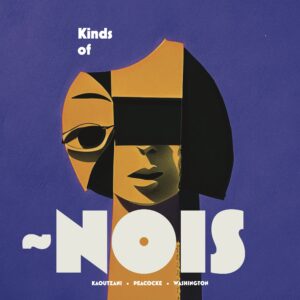Kinds of ~Nois (CD Review)
Kinds of ~Nois
~Nois, Kinds of Kings
Bright Shiny Things
The Bright Shiny Things recording Kinds of ~Nois is the result of a six-year long collaboration between the saxophone quartet ~Nois (Julian Velasco, soprano; Hunter Bockes, alto; Jordan Lulloff, tenor; János Csontos, baritone) and the composer collective Kinds of Kings (Shelley Washington, Maria Kaoutzani, and Gemma Peacocke). The recorded works are generally in a complexly post-minimal style, but each composer has their own distinctive voice. ~Nois’s rich ensemble tone and dexterous rhythms serve the music quite well. One can readily hear that a lot of preparation was put into Kinds of ~Nois, as the performances are note-perfect and assuredly interpreted.
Peacocke’s Hazel begins the recording. A slow introduction of polychords is succeeded by mercurial ostinatos that ricochet between parts. The harmonies are equally quixotic, with shifting tonalities and glissandos distressing their framework. Chordal passages, culminating in quickly repeating verticals, descending glissandos, and a boisterous bass-line. This is ultimately offset by a new theme in the alto and soprano saxophones. A smoky slow section creates a mysterious interlude, only to have the fast-paced ostinatos from earlier return and morph into a syncopated groove.
Eternal Present, by Washington, is cast in two movements: I. Now; II. Always. The first movement has a mournful cast, with a plaintive melody and repeating sections of equally doleful verticals. The second movement is sprightly, with short phrases of minor key ostinatos and duets alternating between the upper and lower cohorts of the saxophone quartet. The ostinatos gradually build into a spiderweb of overlapping lines. This is cut into swaths of material interrupted by rests with soft oscillating thirds in the upper voices and a bellicose bass melody. A chorale of repeated chords, followed by the opening passagework, gradually builds into a mass of overlapping gestures played forte, with surprising harmonic shifts interrupted by several pregnant pauses.
Kaoutzani’s Count Me In is a vigorous workout for the quartet that begins with stentorian repetitions that are then replaced by a softer section of the same. Angular duets appear, only to be supplanted by a martial headlong passage of staccato rhythms. Octaves and overtones arrive in a slower tempo, placed in the foreground, but are soon rejected by a speedy agitato rejoinder. The slow music returns with a wispy melody winding its way through various registers, creating a supple denouement.
Watson is not only an accomplished composer, she is also a baritone saxophonist. Csontos is joined by Watson on her baritone saxophone duo piece BIG TALK, a work excoriating rape culture. It begins with a spoken word “Opening Poem,” followed by growling overtones, squalling high notes, and dissonant counterpoint in a fast groove. Octave oscillations, rough low notes, and brawny repetitions are added to the mix. There, there is an interlude with slowly dovetailing lines and a microtonal devolvement of a unison. Howling ascents create a visceral effect, as do altissimo shrieks. This is succeeded by a quick polyrhythmic duet in the low register, aggressive in demeanor. Repeated unisons are gradually replaced by complex overlaps of imitative lines. The duo adds noise to inexorable repetitions. Once again, there is a set of polyrhythms, this time a heterophonic unison melody. Two-voice counterpoint speeds towards repeated notes, unisons that are then distressed with dissonant seconds. A melody is overlaid in the top voice and a new ostinato, wide-ranging with sepulchral bass notes, articulates the phrase structure. An abrupt close slams the door on this violent piece that provides commentary that even eloquent texts about rape culture might not.
Shore to Shore by Kaoutzani is the most adventurous piece, with multiphonics and fluttering trills adorning the first section’s slow-moving, lyrical ambience. Stacked canons are then unfurled to create an animated, contrapuntal coda. Peacocke’s Dwalm ends the recording with a polytempo excursion in which slow drones and chords are juxtaposed against repeated notes and quickly moving ostinatos. As these elapse, the quartet drops into synced motoric passages. The coda brings in an attractive new melody that once again is deconstructed in overlapping fashion, followed by repeating octaves that pulse until a sudden final vertical. Dwalm’s digressive character is a fetching approach to retaining minimal elements while still featuring an element of surprise. An excellent closer to Kinds of ~Nois: a recording that is highly recommended.
-Christian Carey
